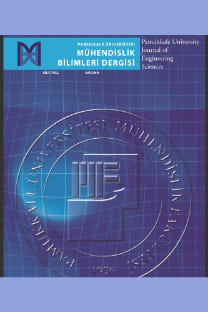Fotonik Kristal Temelli Sıcaklık Algılayıcısının Duyarlılığının İyileştirilmesi
Algılayıcı, Fotonik kristal, Fotonik kristal dalga kılavuzu, Yavaş ışık
Enhancement of Sensitivity of Photonic Crystal Based Temperature Sensor
Sensor, Photonic crystal, Photonic crystal waveguide, Slow light,
___
- Nair V, Vijaya R. "Photonic Crystal Sensors: An Overview". Progress in Quantum Electronics, 34(3), 89–134, 2010.
- Gu L, Jiang W, Chen X, Chen Ray T. "Thermooptically Tuned Photonic Crystal Waveguide Silicon-On-Insulator Mach–Zehnder Technology Letters, 19(5), 342-344, 2007. IEEE Photonics
- Joannoupoulos JD, Johnson SG, Winn JN, Meade RD. Photonic Crystals: Molding the Flow of Light. 2nd ed. New Jersey, USA, Princeton University Press, 2008.
- Monifi F, Djavid M, Ghafari A, Abrishamian MS. "Design of Efficient Photonic Crystal Bend and Power Splitter Using Super Defects". Journal of Optical Society of America B, 25(11), 1805-1810, 2008.
- Boscolo S, Midrio M, Krauss TF. "Y Junctions in Photonic Crystal Channel Waveguides: High Transmission and Impedance Matching". Optics Letters, 27(12), 1001-1003, 2002.
- David M, Ghaffari A, Monifi F, Abrishamian MS. "T-Shaped Channel Drop Filters Using Photonic Crystal Ring Resonators". Physica E, 40(10), 3151-3154, 2008.
- Wang CC, Chen LW. "Channel Drop Filters With Folded Directional Couplers in Two-Dimensional Photonic Crystals". Physica B, 405(4), 1210-1215, 2010.
- Manzacca G, Paciotti D, Marchese A, Moreolo MS, Cincotti G. "2D Photonic Crystal Cavity-Based WDM Multiplexer". Photonics Applications, 5(4), 164-170, 2007. and
- Tekeste MY, Yarrison-Rice JM. "High Efficiency Photonic Crystal Based Wavelength Demultiplexer". Optics Express, 14(17) 7931-7942, 2006.
- Altug H, Englund D, Vuckovic J. "Ultrafast Photonic Crystal Nanocavity Laser". Nature Physics, 2, 484-488, 2006.
- Kumar A, Kumar V, Suthar B, Bhargava A. "Wide Range
- ISSN: 1300-7009
- Yayın Aralığı: 7
- Başlangıç: 1995
- Yayıncı: PAMUKKALE ÜNİVERSİTESİ
Karekök Ortamlı İkinci Dereceden Geçiş-İletkenliği Türü Evrensel Süzgeç Tasarımı
Çift Yanlı Doğrusal Hareketli Sürekli Mıknatıslı Senkron Motorun Parametrelerinin Belirlenmesi
Abdullah BAŞÇI, Adnan DERDİYOK, Emrah MERCAN
Şebekeye Bağlı Fotovoltaik Sistemler İçin Flyback Mikro-evirici Tasarımı
Sinan ZENGİN, Fırat DEVECİ, Mutlu BOZTEPE
SQUARE-ROOT-DOMAIN SECOND-ORDER TRANS-ADMITTANCE TYPE UNIVERSAL FILTER DESIGN
Fotonik Kristal Temelli Sıcaklık Algılayıcısının Duyarlılığının İyileştirilmesi
Fulya BAĞCI, Seda TEZCAN, Barış AKOĞLU
Yeraltı Kablolarında Silindirik Ekranlamanın Performans Analizi
